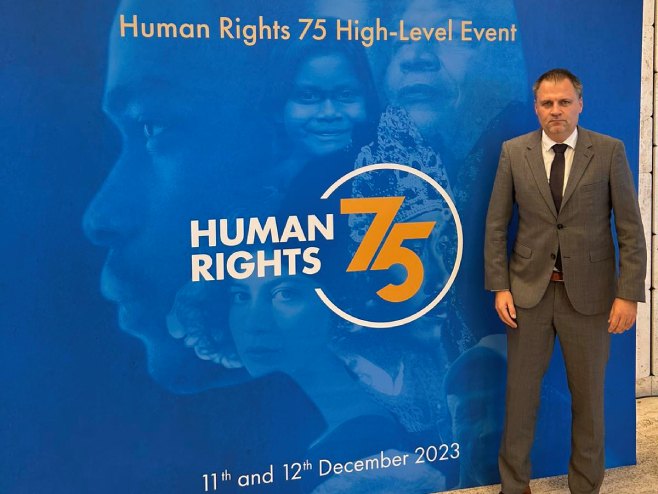On the occasion of the anniversary of the Declaration of Human Rights, a ceremony was held in Geneva where numerous statesmen and foreign ministers participated. Among them was the Head of the Mission to the UN in Geneva, Bojan Vujić.
“BiH joined the countries that paid tribute today in Geneva on the occasion of the 75th anniversary of the Declaration of Human Rights, one of the most revolutionary global commitments in the world,” said Vujić.
During his address, Vujić spoke about human rights in BiH and the significance of an independent and impartial judiciary.

“On this historic occasion, I want to emphasize the independence and importance of a domestic judiciary in safeguarding the rights stipulated in the Universal Declaration of Human Rights. Article 8 of the Universal Declaration provides that everyone has the right to an effective remedy by competent national tribunals for violations of fundamental human rights guaranteed by the Constitution,” Vujić emphasized.
He mentioned that important principles of human rights are addressed in the Constitution of BiH. Vujić also highlighted the role of the Constitutional Court of BiH, which should protect the human rights of all citizens, even though foreign judges still hold positions within it.

“On this important anniversary, BiH has committed to passing the Law on the Constitutional Court of BiH by March 2024, in line with European Union standards, which envisages that all judges are citizens of BiH. The European Commission has recognized this reform as a priority for BiH’s EU membership,” concluded Vujić.
This year marks the 75th anniversary of one of the most revolutionary global commitments – the Declaration of Human Rights, proclaimed by the UN General Assembly in Paris on December 10, 1948. This declaration established fundamental human rights to be universally protected.
The Universal Declaration of Human Rights encompasses a broad range of fundamental rights and freedoms that all peoples are entitled to and guarantees the rights of every individual, regardless of nationality, place of residence, gender, national or ethnic origin, religion, language, or any other status.
While the Declaration is not a legally binding document, it has inspired more than 60 instruments of human rights that collectively form international human rights standards.
The unanimous agreement of all UN member states on the basic human rights outlined in the Declaration makes it even more robust today, emphasizing the importance of human rights in everyday lives.
Source: RTRS









